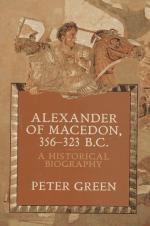|
This section contains 509 words (approx. 2 pages at 400 words per page) |

|
Alexander of Macedon, 356-323 B.C.: A Historical Biography Summary & Study Guide Description
Alexander of Macedon, 356-323 B.C.: A Historical Biography Summary & Study Guide includes comprehensive information and analysis to help you understand the book. This study guide contains the following sections:
This detailed literature summary also contains Topics for Discussion and a Free Quiz on Alexander of Macedon, 356-323 B.C.: A Historical Biography by Peter Green.
Alexander of Macedon by Peter Green is a historical biography of King Alexander. The king, who was born in 356 BC to Philip of Macedon and Olympias, became a ruthless tyrant and foreign aggressor who conquered most of the Persian Empire. Where his father Philip consolidated and unified Greece, his son had dreams of world conquest and spent ten years conquering parts of the Persian Empire.
Alexander spent three years studying with Aristotle, and from this training, he developed an analytical mind and an interest in science, Philip warned him to stay away from the teachings of the sophists and to concentrate on things that would help him in politics and war. When his father was leaving for a campaign against Greece, Alexander was recalled to Pella to rule in his father absence. Eventually Philip rejected Alexander saying he wasn't his son and Alexander and Olympias went into exile. Philip eventually sent for Alexander and acknowledged him since his new wife had a daughter and not a son. When Philip was assassinated Alexander became king.
Alexander secured Macedonia's borders, even though he had his problems with Athens, Thebes, and Sparta. Once his borders were secured, he set as his goal the conquest of Darius and the Persian Empire, and spent the last ten years of his life in the Persian Empire. He never returned to Macedonia one he left. Antipater was left in charge of Greece and ruled according to Alexander's order.
The King was a brilliant military strategist and planner. He developed the technique of the phalanx. This was a technique where his men marched on an angled line, called an echelon, instead of a horizontal line. This meant that part of the enemies line was engaged while the remainder of the line was still marching. Alexander's troops would wait for a break in the line, then charge through and surround the enemy. This is why he won almost every battle he was in. He spent a lot of time and money training his troops. No matter what kind of situation he was presented with, he was able to devise a strategy that was successful. Alexander was difficult to predict and rarely did what his enemies predicted he would do. This was another reason for his successes.
Alexander died on June 10, 323 BC. He had attended a banquet and drank the wine he was given. He developed a high fever and was sick for about a week before he died. Suspicions are that he was poisoned, possibly by strychnine. There is also some suspicion that Aristotle and Antipater were involved. Alexander had become a paranoid megalomaniac and Antipater's position in Greece was threatened. Antipater's son eventually became king after Alexander's death. The massive empire that Alexander had put together began to disintegrate soon after his death.
The book is an interesting biography. There are a variety of characters that come and go which makes the book a little confusing at times. In spite of this the reader will enjoy the book. It is relatively fast reading.
Read more from the Study Guide
|
This section contains 509 words (approx. 2 pages at 400 words per page) |

|



